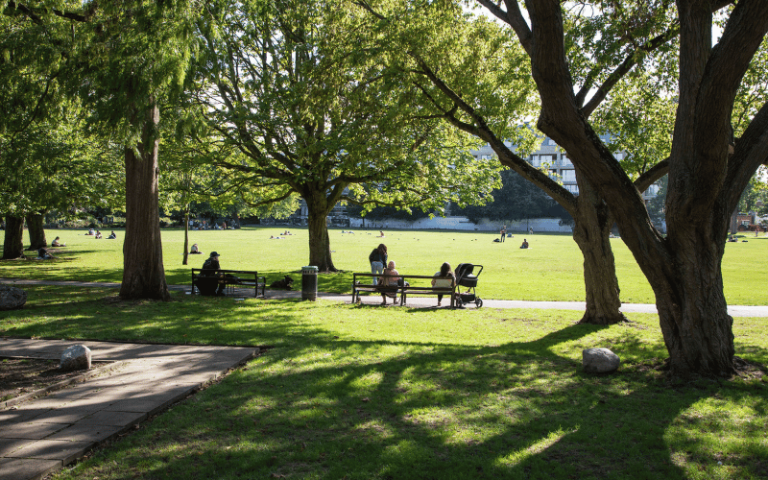UCL student-led research helps shape how Camden Council responds to pressing community challenges
A new partnership, involving UCL students carrying out in-depth research on behalf of Camden Council, is contributing to tangible changes in the borough.

24 August 2023
The community-focused research has taken place as part of a new work-based project module on UCL’s Sociology BSc degree.
Final year students were given the chance to become ‘sociological consultants’, working on an extensive body of research on behalf of a partner organisation.
Camden Council was the first partner to sign up to the new initiative, recognising the huge value in having experienced UCL students carrying out research on their behalf. Both projects focused on issues the Council was keen to address but didn’t have the resources to explore in depth in-house.
The first project centred on parks in Camden, and specifically how the Council could make its parks more accessible to women. The second project focused on Camden’s young queer community. The aim here was to help the Council better respond to the needs of this demographic, given that around 40% of local queer venues have now closed.
Project 1: Reimagining public spaces for women
This project looked at Talacre Park in particular, a space that wasn’t being used as much as the Council would have liked. The UCL student team identified that many women didn’t feel safe there.
Conducting detailed interviews with park users and drawing on sociological theory on gender equality to guide their research, they then came up with practical solutions for the Council to implement. This included things like increasing the seating and shelters in the space, making sure there were places people could get refreshments, and adding better toilets.
Project 2: Informing Camden’s evening and night-time economy strategy
The second project again focused on how the Council could better serve the needs of people in the borough, this time queer young people.
The team worked closely with a diverse cross-section of people from the queer community to understand their usage of queer spaces and what they wanted from them. They then came up with solutions to encourage greater participation in venues, including designated queer nights with welfare officers to help people feel safer while socialising.
Well received by the Council
Both projects culminated in an in-depth report, outlining the research and proposed solutions. The work was of such a high quality that it has informed the Council's evidence base and business case for improving a much-loved local park, and for shaping their night-time economy strategy.
"We're very impressed with the work that UCL students have done on our behalf. They've conducted in-depth research into two important issues for our borough, and their findings have been invaluable in helping us to develop our policies and services," says Elena Murray, Senior Policy and Projects Officer, Camden Council.
"The students were able to approach the issues with a unique perspective and high level of expertise. This has fed directly into our policy development. We're now working with UCL to develop more projects like this, so that we can continue to benefit from the expertise and insights of their students."
Professor David Guile, Professor in Education and Work in IOE, UCL's Faculty of Education and Society, says the fact the project has been so successful is testament to the motivation of all the stakeholders:
“One of the big advantages we were able to offer the Council was a team of young, passionate, knowledgeable researchers, many of whom live in the communities we’re talking about. This means they were highly invested in the issues and the places they were working in, and well placed to build the trust needed to capture the perspectives of local people.
“At the same time, Camden Council have been instrumental in the project’s success, believing in its value and what we can offer here at UCL. It’s the mutuality built into this collaboration from the start that’s made it work so well.”
A transformative experience for students
Dr Benjamin Abrams, who is now taking the work-based project module forward this year, underlines how this experience has benefitted the students involved.
“We wanted to give students the chance to use what they’ve learnt on their course to solve real social problems by doing in-depth research ‘out in the wild’. The experience has been transformative for many of them, as they’ve blossomed into these highly effective communicators and social researchers.”
Dr Abrams adds that the project “isn’t just a case of applying theory to practice.”
“We’ve been able to work with a partner to solve pressing issues they were keen to address. Our students were able to draw on sociological research and apply it through community involvement to develop useable solutions based on what local people want and need.”
Lori is one of the students who took part: "Through this project, I believe real, tangible resolutions can occur, which will make the place I live safer and more inclusive. This was the first time in my academic journey where I felt that my hard work can lead to real-life improvements for those who have been marginalised and silenced."
Support from UCL Innovation & Enterprise
UCL’s Sociology BSc teaching team were supported by the Business and Innovation Partnerships team in UCL Innovation & Enterprise.
“The team’s help was crucial in getting this idea off the ground and introducing us to the relevant people at the Council. We’re now excited to run the project again with more partners,” commented Professor Guile.
Links
Find out more about:
- how UCL is transforming lives through collaboration and knowledge exchange
- support for staff to partner with external organisations
- how external organisations can partner with UCL
Photo © Camden Council
 Close
Close

